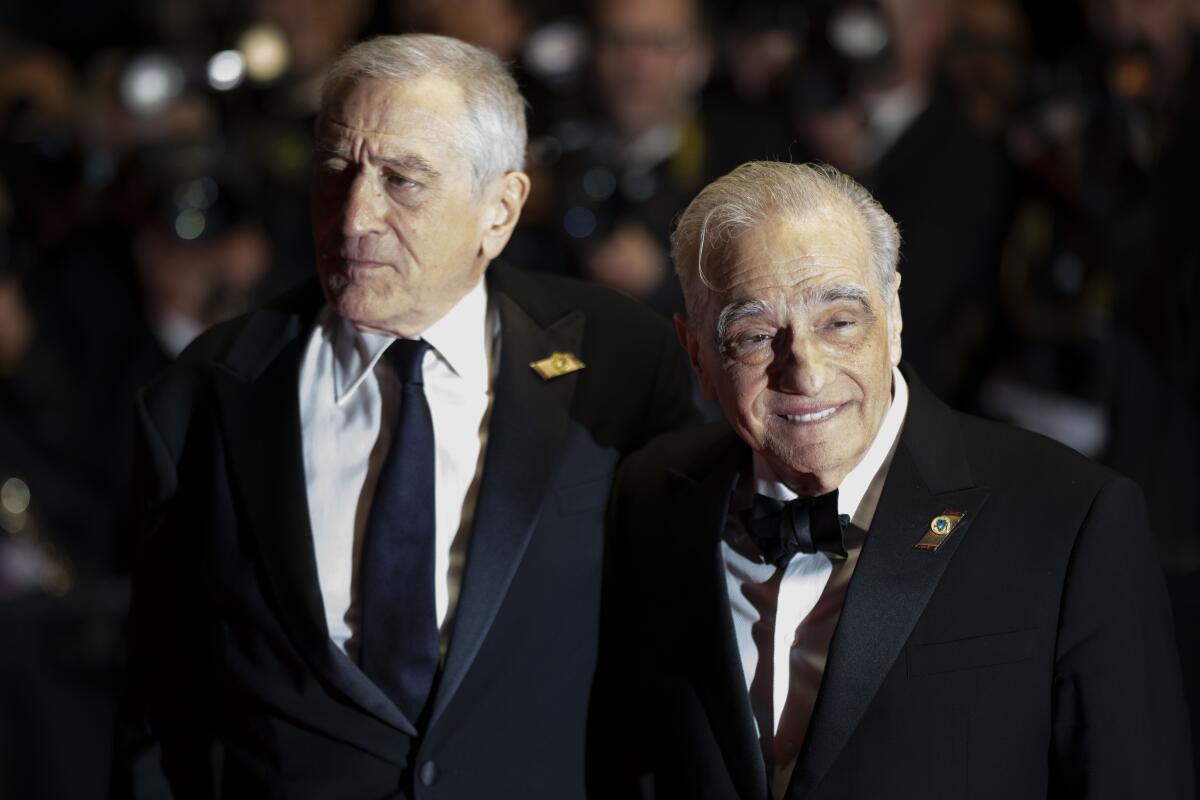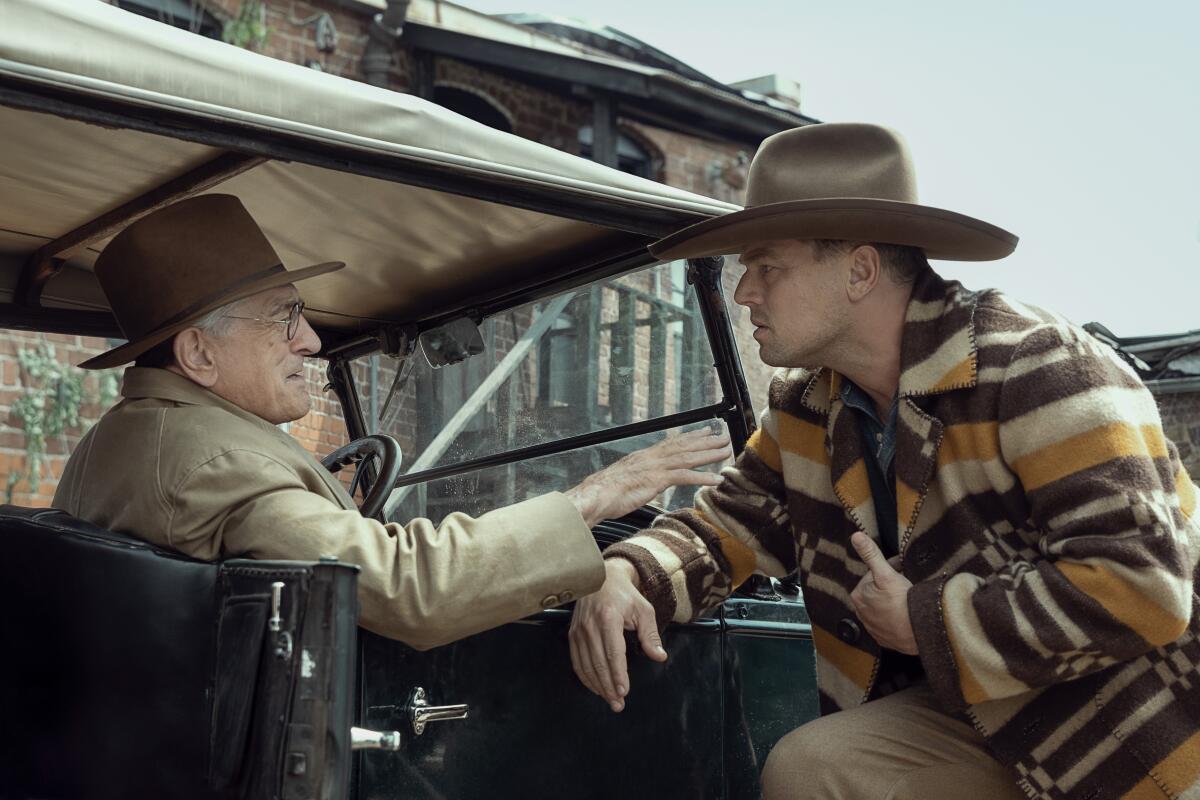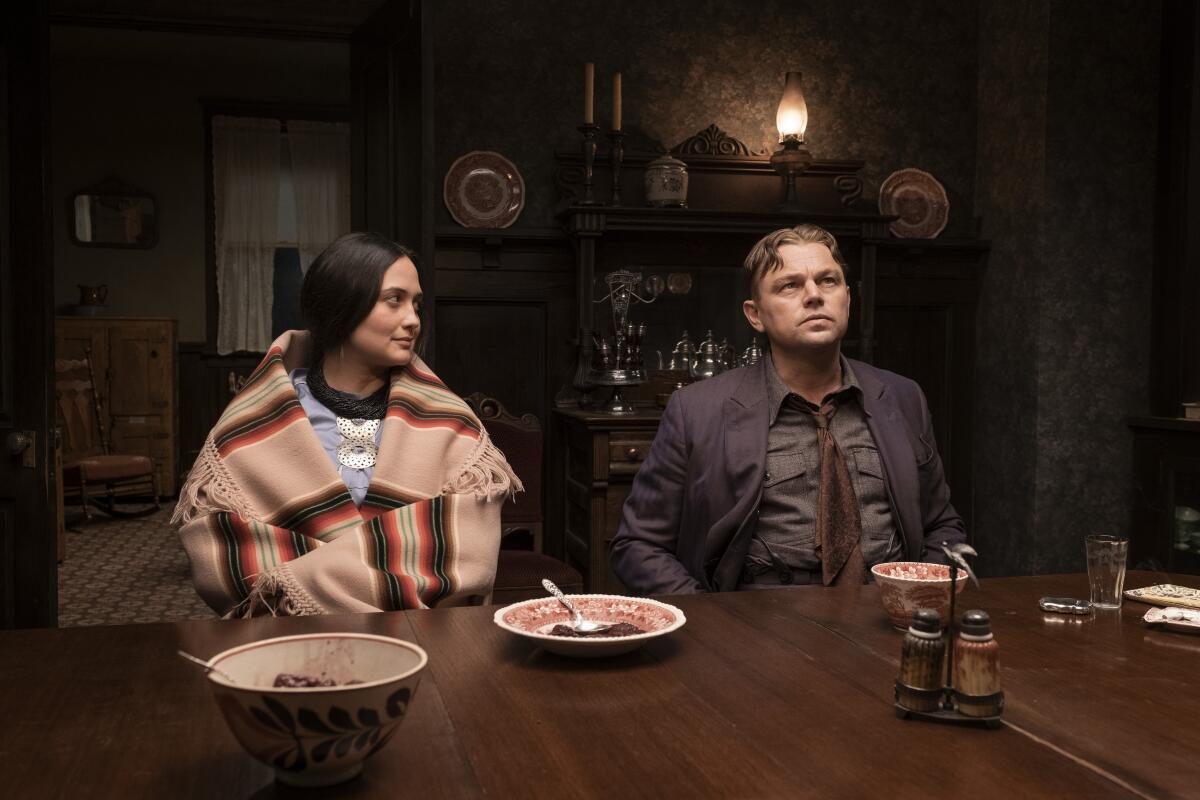Column: Robert De Niro compares villain of ‘Killers of the Flower Moon’ to Trump

- Share via
Robert De Niro blew a hole in a rather careful conversation about racism and American history at the Cannes Film Festival when he described his most evil character to date as being like Donald Trump.
Ruminating on the character he plays in “Killers of the Flower Moon,” Robert De Niro compared William Hale, who helped orchestrate a murderous reign of terror against the Osage nation in the 1920s, to the former president.
“I don’t really understand why he did what he did,” De Niro said, speaking to reporters the day after “Killers of the Flower Moon,” which is based on the nonfiction book of the same name, premiered Saturday night. “There’s a feeling of entitlement [that] I guess you could say we became a lot more aware after George Floyd–systemic racism. It’s the banality of evil and we see it now with — I’m not going to say the name because that guy is stupid.”
A few beats later, he got more specific.
Hale, De Niro said, was able to charm the Osage, who became rich when oil was discovered on their Oklahoma reservation, even as he stole rights to that land through a chilling system of marriage and murder. “[Hale] felt he was loved by people,” he said, “and some people did love him. Look at Trump and there are people who think he could do a good job. Imagine that, how insane that is.”

De Niro has long been an outspoken critic of the former president — ”F— Trump” became as famous a personal tag line as, “You talkin’ to me?” His Cannes commentary was, unsurprisingly, met with thunderous applause from the gathering of international journalists, and it lighted up what had been a rather solemn event, befitting the film’s horrific subject matter.
Martin Scorsese, Leonardo DiCaprio, Lily Gladstone and Osage Chief Geoffrey Standing Bear described the evolution of the book’s focus from the role that the nascent FBI played in bringing to justice Hale and his cronies, including his nephew Ernest Burkhart (DiCaprio), to a cinematic story that dealt more with the crimes they committed against the Osage nation.
Scorsese said he was aware of the risks of having a white man make a film about a little known and completely horrific chapter of American history — more than 60 Osage were murdered, robbed of their land rights, or both before the U.S. government stepped in.
The searing, sprawling ‘Killers,’ which premiered Saturday at Cannes, is both like and unlike anything its director has ever done.
“When the book was presented to me, I understood that if we go anywhere near Indigenous nations, you have to be careful and respectful,” he said. “When we had a first meeting with Chief Standing Bear and the council, I was so moved by what I heard, their values about love and respect and loving the Earth, [and] really understanding how to live on this planet. I found that the values were so important to me; they reoriented me every time.”
In early talks about structuring the film, Scorsese said he did not want to make it a cop drama, or a story about how the FBI swooped in to save the day. “I said the audience is ahead of us, they don’t need to know who did it but who didn’t. Leo,” he added, “was supposed to play [Agent] Tom White, which Jessie Plemons played, and he came to me and asked, ‘Where’s the heart of this story?’ ”
The heart, he realized, lay in the relationship between Ernest and Mollie Burkhart (Gladstone), the Osage woman he marries, in part because Hale needs him to inherit her family’s land rights.

“When we talked about it with the tribal council, that’s what everyone talked about — did he love her, did she love him?,” Scorsese said. “So that became our story — his betrayal of Mollie and the betrayal of the Osage.”
“We took great pride in telling the story as best we could,” said DiCaprio, “and took great pride in having them here with us. What Marty does so incredibly well is he’s able to expose the humanity of some of the twisted, sinister characters. The gamble was to take on this incredibly important story that was a reckoning of our past, much like the Tulsa massacre, that people are starting to learn about.”
Gladstone, who has Blackfeet and Nimíipuu ancestry, found inspiration from her own grandmother, who, she said, was Mollie’s contemporary, and emphasized that though the film was based on detailed research, “Killers of the Flower Moon” was art, not anthropology.
“Native people are used to having anthropologists curious about everything that we do,” she said. “ These artistic souls on this stage cared about telling a story that pierces the veil about what society tells us about what we’re supposed to care about or not. Who else is going to challenge people to challenge their own complicity in white supremacy on such a platform except this man here,” she asked, motioning to Scorsese. “Other artists are doing that work; people listen to what this one says.”
Standing Bear and the tribal council had many concerns when the film was proposed. “Early on, I asked Mr. Scorsese, ‘How are you going to approach the story?’ He said, ‘I’m going to tell the story about trust, trust between Mollie and Ernest, trust between the outside world and the Osage, and the betrayal of those trusts, a deep betrayal.’ My people suffered greatly and to this day, those effects are with us. But I can say on behalf of the Osage people, Marty Scorsese and his team have restored that trust and we know that trust will not be betrayed.”
He also thanked the director for using Osage people on the film as extras and behind the scenes and for featuring so much of the Osage language. “Our language is dying,” he said. “You speak better Osage than some of our Osage,” he added, nodding at De Niro.
And, while DiCaprio, Scorsese and De Niro repeated the importance of revealing this story to the world, Standing Bear admitted that the process had been a revelation to his people as well. “We saw how hard these actors worked, how serious they were. We have preconceptions, that Bob De Niro wakes up and everything just comes out, but these are very hardworking people.”
More to Read
The biggest entertainment stories
Get our big stories about Hollywood, film, television, music, arts, culture and more right in your inbox as soon as they publish.
You may occasionally receive promotional content from the Los Angeles Times.












